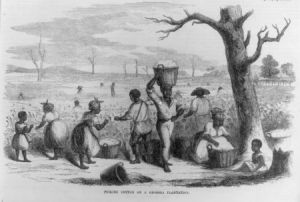 Unlike Southern Baptists, Primitive Baptist churches and associations of the South tend toward silence regarding the war. The Towaliga Primitive Baptist Association of Georgia, however, is an exception.
Unlike Southern Baptists, Primitive Baptist churches and associations of the South tend toward silence regarding the war. The Towaliga Primitive Baptist Association of Georgia, however, is an exception.
Meeting today, Towaliga Baptists address the national war as well as an escalating inter-denominational conflict with a Southern Baptist association.
Concerning the Confederacy, these Primitive Baptists marry faith and patriotism in an unmistakable bond:
Resolved, 1st. That we heartily approve of the separation between the North and the South, and the formation of the Southern Confederacy.
2d. That we firmly believe that it is our duty as well as all other citizens to furnish all the means at our command, to establish and forever maintain a separate and distinct government from that of the United States.
3d. We thank God for the success that has hitherto crowned our arms, and we pray that he may sustain them until the successful and triumphant termination of the war.
The national conflict also seeps into a response to Flint River Baptists (from whom they had “withdrawn” some years prior) over the issue of proper mission methodology (Primitive Baptists maintain that missionaries should be supported directly by local congregations, the biblical model, while Southern Baptist missionaries are funded by monies channeled through denominational organizations). Voicing an apparent disagreement with Flint River Baptists over the cause of the war, Towaliga Baptists offer an explanation more nuanced than that of most Baptists North and South: the war came about primarily not because of slavery, but because politicians played fast and loose with the Constitution of the United States [at least partly] over the issue of slavery.
You [Flint River Baptists] go on to say, as well might it be said, that christianity was the cause of persecution [of Christians of the South] or that slavery was the cause of the disruption of the United States Government, we reply that the cause of the persecution [of Southern Christians] was the various notions of men [specifically, denominational organizations], which notions were contrary to God’s word, or such opinions as could not be sustained by the Bible. The United States government was destroyed, not because of slavery, but the introduction of opinions, out side of and contrary to the letter and spirit of the Constitutional compact, upon which the government was formed, one party contending for a strict construction of the constitution, and the other for a latituduous construction of that Instrument, and finally for a higher law [abolitionism, or the equality of the races], the result was, encroachment after encroachment ensued until the opinions of men was. Submission to the distraction of all constitutional rights or secede from those who destroyed it.
Towaliga Baptists, in short, evidence a consistency in a strict interpretation of the Bible and the U.S. Constitution, maintaining that only those commands, laws, examples and practices spelled out in each respective document should be adhered to by Christians and Americans, respectively.
Of the latter, however, Southern states prior to the war were themselves guilty of constitutional innovation, not the least in their demands that a constitutional amendment override the runaway slaves laws enacted by Northern states. In general, despite the protests of Towaliga Baptists, the states of the Confederacy, in the decades prior to the war, had sought to amend American judicial law to protect the practice and expansion of African slavery.
Resource: “Minutes of The Towaliga Association, 1862,” pp. 3, 9


